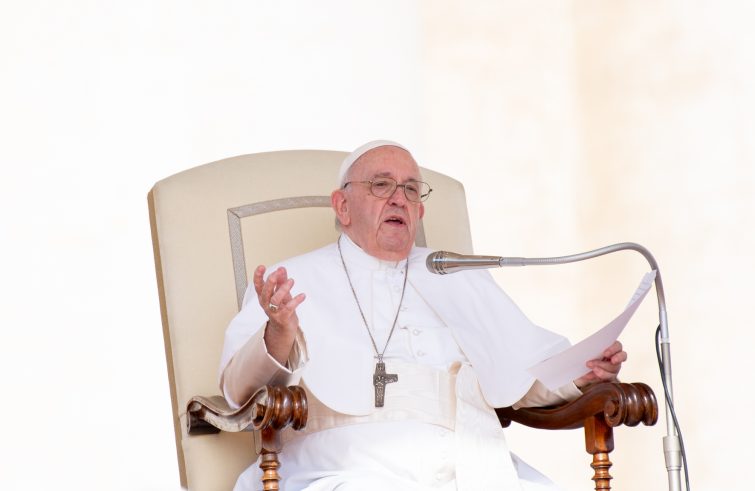
“Kazakhstan has made very positive choices, such as saying ‘no’ to nuclear weapons and making good energy and environmental policies. This was courageous. At a time when this tragic war brings us to the point where some people are thinking of nuclear weapons, that madness, this country says ‘no’ to nuclear weapons from the very beginning”, Pope Francis said during the general audience in St. Peter’s Square devoted to his recent visit to the Asian country on the occasion of the 7th Congress of Leaders of World and Traditional Religions. This initiative, Francis said, “has been carried out for 20 years by the Authorities of the country, which presents itself to the world as a place of meeting and dialogue, in this case at the religious level, and thus as a leading player in promoting peace and human brotherhood.” Retracing the various legs of his visit, the Holy Father highlighted the importance of “putting religions at the centre of efforts to build a world where we listen to each other and respect each other in diversity.” “And this – he added off text – is not relativism, no, it is listening and respecting.”
Credit for this must be given to the Kazakh government, which, having freed itself from the yoke of the atheistic regime, now proposes a path of civilization that brings together politics and religion, without confusing or separating them, while clearly condemning fundamentalism and extremism.”
Final statement. Francis thus recalled the Final Statement discussed and approved by the Congress,
“which stands in continuity with the one signed in Abu Dhabi in February 2019 on human fraternity.
I like to interpret this step forward as the fruit of a journey that starts from afar: I am thinking, of course, of the historic Interfaith Meeting for Peace convened by St. John Paul II in Assisi in 1986, much criticized by people who lacked vision; I am thinking of the far-sighted gaze of St. John XXIII and St. Paul VI; and also that of great souls of other religions – I limit myself to recalling Mahatma Gandhi.”
A country of encounter. Thus the Pope defined Kazakhstan, pointing out that about one hundred and fifty ethnic groups coexist there and more than eighty languages are spoken. “This vocation”, Francis said, “deserves to be encouraged and supported.” Francis referred to the local Church as a community of happy, joyful people filled with enthusiasm.” A “small flock, but open, not closed, not defensive, open and trusting in the action of the Holy Spirit.” “We also remembered that grey part – he continued – the martyrs of that holy People of God, because they suffered decades of atheistic oppression, until liberation thirty years ago, men and women who suffered so much for the faith” during the long period of persecution. “Murdered, tortured, imprisoned for the faith”, Francis added off text. “With this small but joyful flock, we celebrated the Eucharist, also at Nur Sultan, in the Expo 2017 plaza, surrounded by ultra-modern architecture. It was the feast of the Holy Cross. And this – the Pope underlined – leads us to reflect:
in a world in which progress and regression are intertwined, the Cross of Christ remains the anchor of salvation: a sign of hope that does not disappoint because it is founded on the love of God, merciful and faithful.
Our gratitude goes out to Him for this journey, as does our prayer that it will be rich in fruit for the future of Kazakhstan and for the life of the pilgrim Church in that land.”
The suffering of the Ukrainian people. At the end of the general audience, before the greetings to the Italian-speaking faithful, Francis extended his thoughts, yet again, to the “tormented Ukraine.” “I would like to mention the terrible situation in tormented Ukraine – Francis said in unscripted remarks -. Cardinal Krajewski went there for the fourth time. Yesterday he telephoned me, he is spending time there, helping in the area of Odessa and bringing closeness.
He told me about the pain of this people, the savagery, the monstrosities, the tortured corpses they find.
Let us unite ourselves to this people who are so noble and martyred”, is the Pope’s exhortation.
Persons affected by Alzheimer’s disease and patients dealing with haemodialysis. Finally, the Pope said a prayer for person’s affected by Alzheimer’s: “Today is World Alzheimer’s Day, a disease that affects so many people, who are often pushed to the margins of society because of this condition. Let us pray for those suffering from Alzheimer’s, for their families, and for those who lovingly care for them, that they may be increasingly supported and helped”, Francis said, associating in this prayer also the men and women dealing with haemodialysis, dialysis, and transplantation who are represented here.”












